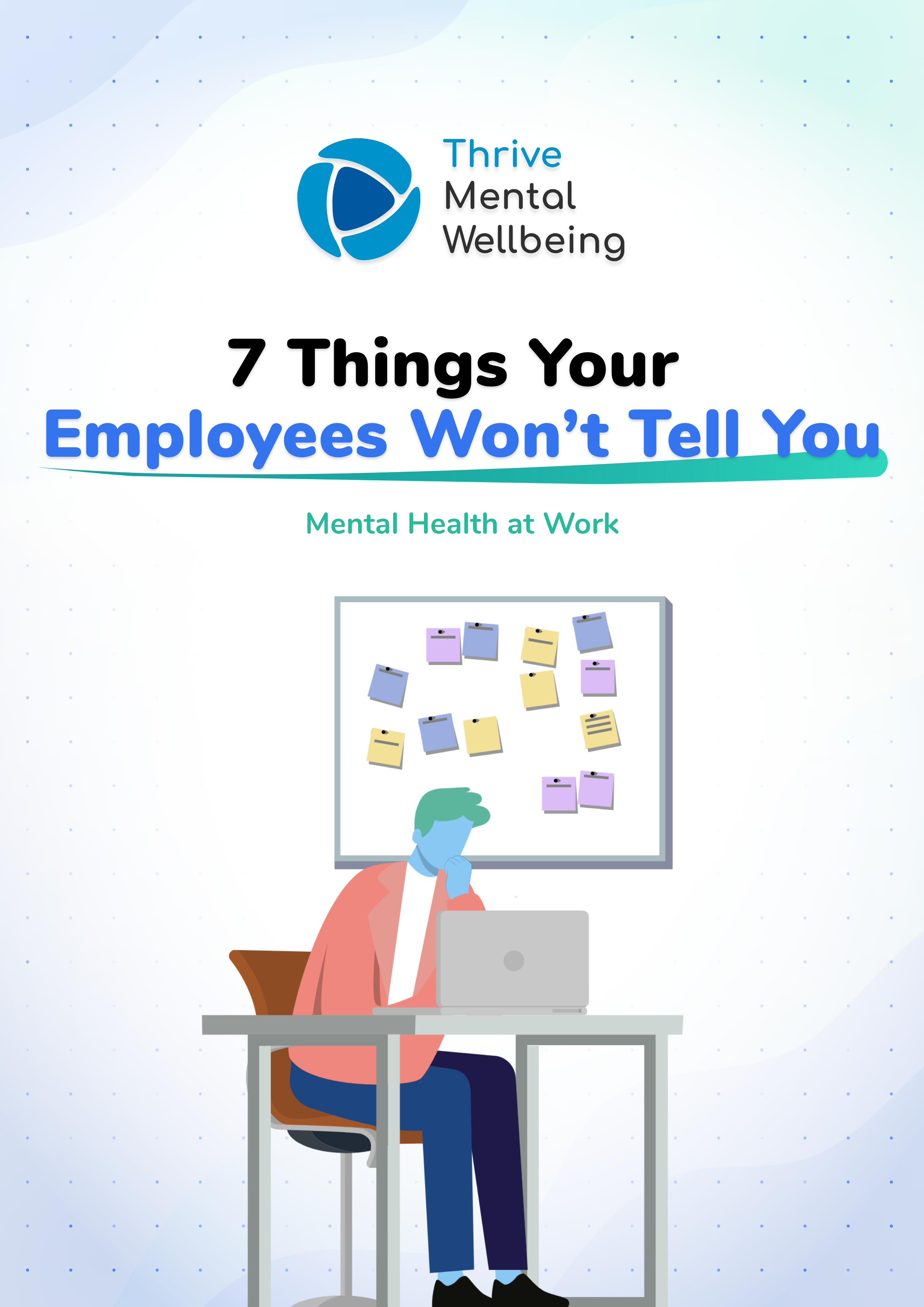
May 21, 2024
Mental Health At Work: 7 Things Your Employees Won’t Tell You
Whether in a bustling office or the quiet solitude of remote work, a silent story often goes untold in any work environment.
There are internal battles your employees face, with unspoken experiences tied to mental health that directly impact their performance, wellbeing, and overall happiness at work.
Do you know how your employees truly feel? What their silent struggles are? If they’re dealing with stress at work or grappling with anxiety and depression while trying to stay afloat in their professional roles?
In this piece, we will dive beneath the surface-level exchanges, beyond the replies of "I'm fine," to explore the critical but often overlooked aspect of mental health at work.
Our mission is to provide a comprehensive, empathetic understanding of the internal landscapes of your team members' minds, to expose their silent battles, and to encourage dialogue that can lead to genuine changes in our workplaces.
1. The silent suffering: struggling with mental health at work
When we peel back the layers of professional personas, we uncover unseen struggles with anxiety, depression, isolation, and the threat of burnout lurking in the shadows.
Often, these mental health challenges at work are invisible to the naked eye, hidden behind a brave face, or buried under the guise of resilience.
These issues can extend beyond the commonly understood range of mental health concerns, seeping into areas rarely discussed in professional settings, such as insomnia, the effects of menopause, loneliness, eating disorders, and more.
Here are two anonymous case examples:
- A well-performing manager known for her high output and vivacious personality, yet ‘J’ was dealing with crippling anxiety and insomnia. Every email sent late into the night was proof not of dedication but a cry for help obscured by sleepless nights.
- ‘D,’ working remotely from his home, grappled with intense feelings of loneliness, feeling isolated from his team. While his colleagues praised his independence, they didn’t see his desperate struggle against the suffocating silence that surrounded him each day.
These stories represent just a fraction of the silent suffering endured by employees every day.
Each case underlines the detrimental impact that struggling with mental health can have on work performance, and more importantly, on personal wellbeing.
Employees fighting these silent battles may experience an inability to concentrate, decreased productivity, constant fatigue, and a steep decline in job satisfaction.
While it's easy to disregard these signs of stress at-work symptoms, or dismiss feelings of stress and anxiety as a "normal" part of work life, it's vital to pay heed to these signs early on.
As much as we pay attention to physical ailments, this same vigilance should extend to mental health stress at work. Incorporating early detection mechanisms can help recognise these signs before they escalate, enabling you to support colleagues better and create a more understanding and inclusive work environment.
The critical first step is to cultivate an atmosphere where these narratives can be shared and understood.
We need to open a dialogue about mental health at work, break down stigmatised barriers, and begin the journey to foster a truly health-conscious work environment, both physically and mentally.
2. Stress overload: common symptoms of stress at work
Overwhelming workloads have become a disheartening norm.
The unspoken expectation to constantly hustle, combined with the pressure of unrealistic deadlines, has transitioned from a phase to an all-encompassing way of life. Leading to anxiety at work and chronic overload that is detrimental not just to their productivity but also to their mental wellbeing.
The consequences of stress at work are far-reaching, infiltrating every aspect of one's life.
- Disrupted sleep patterns
- Strained relationships
- Plummeting job satisfaction
- Gradual degradation in mental health
These are only the tip of the iceberg. A high-stress environment also triggers feelings of
- Fatigue
- Irritability
- Decreased morale
- Unproductivity
- Disengaged workforce
Numerous studies corroborate the adverse outcomes of overbearing workloads, emphasising the correlation between work-related stress and heightened risk for mental health disorders.
Anxiety, burnout, depression at work, and even post-traumatic stress disorder are increasingly common conditions surfacing in the background.
By dealing with the issues head-on and acknowledging the symptoms of stress at work, you can promote a healthier work-life balance and create workplaces that prioritise mental resilience and healthy work habits.
3. A call for balance: the quest for harmony between work and life
Achieving work-life balance is more than a perk—it's essential for sustaining both mental health and job performance.
When work starts to overshadow life, the consequences are dire: burnout, weakened personal relationships, and decreased productivity.
Instead, striking the right balance can significantly boost wellbeing, job satisfaction, and employee output.
Creating a culture that values this balance involves implementing supportive policies, such as flexible scheduling and remote work options. It's also about shifting societal expectations that often appraise overworking as a badge of honour.
Managers must take the lead by encouraging balance and setting a personal example.
Companies that proactively promote and enact balance not only foster happier employees but also reap the benefits of a more dedicated and efficient team.
It's high time that work-life balance is viewed as a fundamental aspect of a successful and sustainable workplace, and not as an optional extra.
4. Fear of reprisal: mental health discrimination at work
In many workplaces, the fear of discrimination and reprisal stifles crucial discussions about mental health.
Employees often worry that opening up about their struggles could lead to stigmatisation, jeopardise their jobs, or tarnish their reputations. This pervasive anxiety discourages many from seeking the help they desperately need, perpetuating a cycle of silent suffering.
Societal and organisational stigmas around mental health are profound, leading to marginalised employees and worsening their conditions in the shadows.
Breaking this cycle requires a concerted effort to normalise mental health conversations at work.
Forward-thinking companies can lead by example, implementing supportive practices like:
- In-house mental health resources
- Management-led discussions on wellbeing
- Non-judgmental support systems
Such initiatives not only challenge the status quo but also signal to employees that their mental health is valued and protected.
By acknowledging and acting against mental health discrimination at work, organisations can cultivate a culture of inclusivity and understanding.
5. Mental health policies: when the unspoken journey begins
Comprehensive mental health policies are at the heart of a supportive workplace.
These policies are clear, legally astute, and imbued with compassion. They are pivotal for ensuring workers' psychological wellbeing.
Leadership plays a vital role in entrenching these policies into corporate culture, demonstrating that care for mental health at work is valued and normalised.
Key components of a robust mental health policy include:
- Awareness Programs: Initiatives to educate staff on mental health, fostering an understanding environment.
- Early Intervention: Mechanisms for early detection and support for those experiencing mental health issues.
- Employee Support: Accessible assistance such as flexible work options and counselling services.
- Confidentiality Guarantees: Strict privacy policies safeguarding employees who seek help.
- Reintegration Strategies: Return-to-work processes for employees recovering from mental health challenges.
REF: https://www.who.int/publications/i/item/9789240053052, https://www.who.int/publications/m/item/mental-health-action-plan-2013-2030-flyer-what-member-states-can-do
These policies serve as a call to action to prioritise mental wellbeing, challenging outdated stigmas and encouraging dialogue from the ground up.
An organisation committed to these standards not only aids in the healing journey but also empowers its workforce to thrive in all aspects of life.
6. No sharing: when employees need to share their mental health struggles
Fear of stigmatisation often drives employees battling mental health issues to seek solace in digital platforms.
They may feel safer reaching out to an app or website rather than discussing their struggles at work—a testament to the dire need for destigmatizing mental health at work.
On a positive note, this dependence on digital solutions underscores the potential for incorporating such tools into a comprehensive mental health strategy.
Online therapy services, mindfulness apps, and digital support networks offer accessible help and serve as a bridge in the interim while workplaces actively strive to create more supportive environments.
However powerful a tool digital solutions may be, it's vital not to lose sight of the critical message—that it's okay, even necessary, to talk about mental health at work. Fostering comfortable, open dialogues will always play a central role in a truly supportive workplace.
Therefore, while digital platforms can indeed aid those in need, they should complement, not substitute, strides towards a more understanding, accepting work environment.
7. Empathetic leadership: a cry for managers who understand and transform
Empathetic leadership is crucial for promoting mentally healthy workplaces. It's about managers who listen, understand, and take actionable steps to support their teams' mental wellbeing.
Thrive Mental Wellbeing’s development programs underscore the significant, research-backed benefits of empathy in management.
These initiatives demonstrate that when employees feel supported, they're more open to sharing their struggles, paving the way for healing and collective growth.
Testimonials from these programs reveal the transformative impact of empathetic approaches, from practical exercises encouraging self-care to workshops that highlight the power of positive thinking. Participants note a profound shift in the workplace atmosphere, where open discussions at work on mental health become the norm and self-care practices are actively encouraged.
By integrating empathetic leadership, organisations prioritise mental health, help individuals, and cultivate a thriving, collaborative, and innovative work environment.
Decoding the numbers: the stark reality of mental health in the workplace
The conversation around mental health in the workplace is growing louder, and punctuated by mental health at work statistics that reveal the urgent need for action in the UK.
Here, we delve into key figures to understand the scale of the issue and drive home the critical need for change.
Key mental health at work statistics:
- Half of the UK Workers Affected: A staggering 48% of workers in the UK have experienced poor mental health in their current job. This overwhelming statistic underscores the pervasive nature of the issue, making it impossible to ignore.
- A Silent Struggle: Despite the high prevalence, the dialogue remains muted, with only 13% of employees feeling comfortable discussing mental health concerns at work. This gap highlights a culture of silence that stifles support and understanding.
- The Cost of Neglect: Mental health issues lead to over 72 million working days lost each year in the UK, underscoring the significant impact on both individual wellbeing and organisational productivity.
These numbers paint a clear picture. Mental health challenges are not just personal issues but are intertwined with the fabric of our workplaces.
The high rate of affected individuals juxtaposed with the low level of dialogue and support spells out an urgent need for a cultural shift. Organisations must move from passive to active support, crafting environments where mental health is prioritised and openly discussed.
Addressing the unspoken: how to talk about mental health at work
A stark revelation from the advertising and marketing sector underscores this dire need: a scant 34% of employees report having a mental health policy at work, highlighting a significant gap in support.
Here are suggested steps towards change:
- Develop Clear Mental Health Policies: Craft and implement comprehensive mental health policies that actively integrate support into the company culture, including provision for mental health days and access to professional support.
- Mental Health Training: Offering training sessions can equip staff and management with the skills to navigate mental health at work sensitively, fostering a supportive environment. Thrive’s Mental Health Training provides exemplary tailored programs enhancing mental resilience.
- Facilitate Open Conversations: Regular mental health events and safe spaces for dialogue can significantly destigmatize mental health discussions at work.
- Mental Health First Aiders: Instituting first aiders for mental health can offer immediate support and guidance, demonstrating a company's commitment to employee wellbeing.
- Adopt Digital Tools: Leverage technology to provide easily accessible mental health resources and confidential counselling.
- Real-World Inspiration: The implementation of mental health first aid at work training among senior leaders in the advertising world has shown promising steps towards cultural transformation, highlighting the pivotal role of senior leadership in mental health advocacy.
REF: https://www.mind.org.uk/workplace/mental-health-at-work/tips-for-employees, https://www.mentalhealth.org.uk/explore-mental-health/publications/how-support-mental-health-work https://championhealth.co.uk/insights/mental-health-wellbeing-tips-at-work/
By actively incorporating these strategies, businesses can transform into sanctuaries of support and openness, proving that addressing mental health at work is not just necessary—it’s imperative for a flourishing corporate ecosystem.
Take action with thrive: prioritise mental health and wellbeing in your organisation
Where the lines between work and life blur, ensuring the mental health and wellbeing of your organisation's people has never been more crucial.
Thrive invites you to champion this transformative journey, ensuring your workplace is not just productive, but also a bastion of support and resilience.
Actionable Steps Forward:
- Acknowledge the Need: Understand that supporting mental wellbeing is not just beneficial but essential for the flourishing of both individuals and the organisation as a whole.
- Partner with Experts: Leverage the expertise offered by Thrive, from their comprehensive Mental Wellbeing App to In-App Therapy and Mental Health Training. These tools are designed to meet your team where they are, offering support that’s accessible and tailored to your needs.
- Implement with Hope: Initiate these services with an outlook of optimism. Each action you take plants the seed for a healthier tomorrow. Empowering your organisation with the resources to manage and prioritise mental health fosters an environment of support, resilience, and growth.
- Measure the Impact: Utilise Thrive’s ROI tools to assess the positive return on investment of prioritising mental health. Understanding the tangible benefits will reinforce the commitment to this vital area and encourage continuous improvement.
- Champion Change: Become an advocate for mental health at work. Share success stories, encourage open dialogues, and build an inclusive culture where everyone feels valued and supported.
The road to transformation is paved with intentional actions. Start your journey now.
Contact Thrive and discover how we can collaborate to uplift and safeguard the mental health and wellbeing of your organisation.
Topics mentioned in this blog post:
Get the latest news with
Thrive Unplugged!
Sign up to our monthly newsletter to receive the latest news on everything Thrive Mental Wellbeing.








